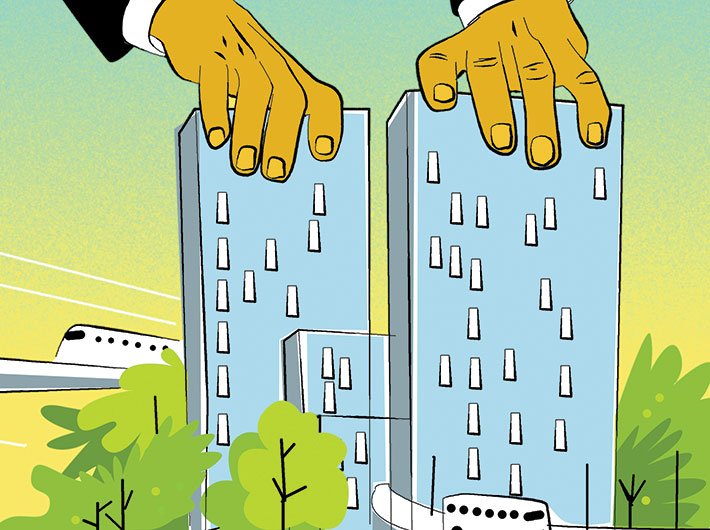Empowering mayors and councillors will go a long way in allowing urban local bodies to start thinking for themselves
On a flight from Bangalore to Delhi, I was ruing not having participated in a smart cities summit in Mumbai. That’s three un-smart cities in one day: un-smart not because of their citizens (they are very smart), but because of their sub-adult city governments.
Almost all Indian city governments are non-smart when it comes to deciding their own destinies. Indeed, an ancient city like Varanasi is paradoxically looking up to prime minister Narendra Modi to deliver a better future for it. In most contexts outside India, whether in Asia, Australia, Europe or the Americas, the mayor would be ensuring her/his own city’s growth, and not looking towards a distant state or national capital.
Smart cities are all the rage over the last three months, so let’s leave the information technology companies and the city infrastructure experts debate the components of a smart city. Most would agree on a smart city including these bare necessities and add-ons: 24x7 drinking and non-drinking water, power, and energy supply.
The other bare minimum would include hygienic conditions for sanitation, sewerage, solid waste management; sustainable environment, including freedom from air and noise pollution; safety and security, including policing and quick judicial resolution. This would also include opportunity or jobs for all; transport connectivity, especially mass public transit systems; housing for all; social infrastructure – including hospitals, schools and pre-schools; leisure infrastructure like public spaces and public arts (not just malls); a responsive city government, for all citizen services, including police and judiciary; and, last but not the least, residents with community spirit and sensitivity towards fellow residents.
In all these areas, we have a number of experts, both national and international, who know exactly how these can be delivered. Further, they think they know how these can be delivered in Indian conditions. These experts are extremely bright and committed, and are usually to be found in Lutyens’ Delhi and its clones in state capitals. They also love working with urban development entities in Delhi or state capitals.
The irony is that most of these experts are urban development tourists, since they have seldom worked for over a month with city government officials in Indian municipal governments. Such officials could be elected (mayors and councillors) or appointed (municipal commissioners, engineers, ward officers, sanitation officers and so on).
A successful mayor in India, who has led her or his city from third-world conditions and upgraded it to smart city is a rare individual indeed. Our public discourse is, sadly, fascinated by municipal commissioners (usually IAS officers whose tenures here are shorter than most other postings). Consider the Gurgaon municipal corporation, created in 2008, which has had 10 municipal commissioners since its inception.
The hapless mayor has no say in the matter. In Chennai, the municipal commissioners are usually well-chosen, and allocated longer terms. The difference in positive outcomes in city governance in Chennai is evident. However, the sub-adult status of the city government vis-a-vis the state government or the national government is something we Indians must resolve before our cities slip into utter helplessness.
Unless we fix the ability of our city governments to deliver smart cities, joint secretaries in Delhi listing down technology fixes cobbled together by ‘experts’ is not going to change outcomes. Anyone with exposure to city governance in India would despair at the very, very low capacity of the organisation to deliver outcomes. Certainly not smart governments.
So how do we make our city governments smart? The simple answer: by making mayors the masters of their cities, politically and administratively. Surely, the democratically elected mayor and councillors of Varanasi deserve this empowerment. However, they have two big groups to contend with: the state and central legislators (MLAs and MPs) and the state capital bureaucracy.
Further, these groups have introduced a ‘flaw’ in city governments, known as rotational reservation (Article 243T of the constitution). This almost guarantees that the present incumbent in a mayoral or councilor post will not be eligible to even contest the next election. This ‘designed to fail’ clause is so little known that it came as a surprise to a leading news magazine editor based out of Delhi. This rotation of reservation does not happen for MPs and MLAs (Art 330 & 332) else our prime minister would not have done more than one term as chief minister.
Since city governments have weak political leaders, they have little say in deciding the officers for their corporations. State capitals post municipal commissioners beholden to them, not to the city they serve. Almost all are from the IAS or state civil services. Honourable exceptions apart, such officials ingratiate the local media, ignore the mayor and councillors and await their recall to the state capital while doing little to make their urban area a smart city.
Now imagine, if over the last 20 years there was no rotation, and elections for mayors followed the same reservation system as for MPs and MLAs. There would have been an incentive for mayors to do well and get re-elected. We would have
definitely seen the emergence of a sizeable number of mayors in India who would have delivered outcomes for their cities. Such empowered mayors and councilors would have exerted enough political authority to select their own municipal commissioner and other officials.
Smart city governance in India is eminently possible within the next five years. Let’s begin by scrapping rotations in reservations for mayors and councillors. Twenty years is long enough for social justice and empowerment, but outcomes matter more in a rapidly urbanising India. If we have smart city governments that deliver smart cities the non-rich would be the biggest beneficiaries.
The rich are moving into their gated communities; it is the not-so-well off who bear the adversities of dysfunctional city governments. The Modi government would do a great favour to urban Indians if it scraps Article 243T altogether, or at least makes reservations in city governments on the same footing as reservations in MP and MLA constituencies as per Articles 330 and 332.
(This article appeared in the September 16-30 print issue)

